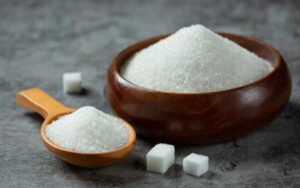At some point or another, we’ve all wondered how much sugar is too much. No matter what you eat, chances are added sugar is present in it. High in empty calories, sugar is the primary reason for weight gain for most people. But some people just cannot get enough of it, from binge eating chocolates to having soft drinks, people get really addicted to sweet taste. We need to cut back on sugar, especially on added sugars in order to achieve optimum health. This article will tell you how much sugar is too much and its health hazards.
Contents
Role Of Sugar

For some people, sugar can cause serious health complications, especially for those who are at risk of diabetes. It’s been linked to weight gain, diabetes, and heart disease. And it’s hiding in a lot of the foods we eat.
Most people consume too much sugar. The average person eats about 22 teaspoons a day. That’s more than triple the amount recommended by the American Heart Association.
It is often added to processed foods, like breads, cereals, and desserts. It’s also found in many beverages, like soda and fruit juice. Even healthy-sounding foods like yogurt can be loaded with sugar, especially the ones that are flavored that is why it’s always best to buy plain yogurt.
Cutting back on it is important for your health. You can do this by eating more whole foods like fruits, vegetables, cereals, etc, as these food contain phytonutrients, antioxidants, and fiber which compensate for the effects of sugar, and fewer processed foods. You should also read food labels to see how much sugar is in a product before you buy it.
How Much Sugar Is Too Much?

We all know that too much sugar is bad for us, but how much is too much? The American Heart Association recommends no more than 6 teaspoons (25 grams) of added sugar per day for women, no more than 9 teaspoons (38 grams) for men, and 30. But the average person consumes about double that amount!
Sources
Most of us get far more sugar than we need from processed foods and drinks. Even foods that don’t taste sweet can be loaded with hidden sugars. To make matters worse, the body metabolizes refined sugars very quickly, leading to spikes in blood sugar levels followed by crashes that leave us feeling tired and craving more sugar.
Beverages contribute the most to added sugars:
- soft drinks – 25%:- Cold drinks contain HFSC (high fructose corn syrup), which is approximately 42% fructose. Moreover, our body is not made to digest this much fructose.
- fruit drinks – 11%:- So-called healthy fruit juices aren’t that healthy since they contain lots of sugar.
- sport/energy drinks – 3%:- Combination of caffeine and sugar might be good for an instant energy boost, but it comes with a cost of health hazards.
- coffee/tea – 7%:- Coffees and teas sold outside have more sugar and are a common source of sugar for every income group.
Read Labels
The first three ingredients make up almost 90% of the product, so it’s always advised to read labels before buying groceries. Labels can say sucrose, sucralose, fructose, HFCS, or simply sugar.
Complications
Over time, consuming too much sugar can lead to serious health problems. There are a few major complications that can arise from consuming too much sugar.
- Diabetes:- When we consume sugar, our body releases insulin to help process it. If we consume too much sugar, our body becomes resistant to insulin, and over time, this can lead to fat build-up obesity, and type II diabetes, which could further lead to many complications if not treated like neuropathy, nephropathy, retinopathy, hypertension, etc. Diabetes mellitus is a serious condition and needs accurate treatment on the basis of severity.
- Heart disease:- Sugar consumption can lead to high triglyceride levels, which can increase your risk for heart diseases such as atherosclerosis, hyperlipidemia, stroke, heart attack, etc. Lastly, sugar can also cause inflammation throughout the body, which has been linked to a variety of chronic diseases like cancer.
- High cholesterol:- Added sugar can raise your bad cholesterol LDL and drop your good cholesterol HDL.
- Non-Alcoholic fatty liver disease:- Most of the fructose gets converted into fat, which builds up in our liver thus leading to fatty liver.
Natural Occurring Vs Added Sugar
There is a big difference between natural occurring and added sugar. Natural occurring fructose is found in fruits and vegetables, while added sugar is found in processed foods.
Added sugar has no nutritional value and can actually be harmful to your health. It can cause weight gain, tooth decay, and other health problems.
Natural occurring sugar, on the other hand, is not harmful to your health. In fact, it can actually be beneficial because it contains vitamins, minerals, and fiber. In nature, fructose comes prepackaged with fiber, antioxidants, and phytonutrients that appear to nullify adverse fructose effects.
Conclusion
It is one of those nutrients that could result in the deterioration of health. Sugar has empty calories that provide no nutritional value and can lead to weight gain, cavities, and other health problems. It is important to be aware of the sugar content in the foods we eat and limit our intake as much as possible. Start by reading food labels and avoiding processed foods as much as possible. Choose whole fruits and vegetables instead of sugary snacks, and opt for water or unsweetened beverages instead of sugary drinks. And when you do indulge in something sweet, savor it slowly instead of gobbling it down!
Consider contacting Mantra Care for additional information on diabetes care. With the support of our Diabetes Control Program. You can also get in touch with their nutrition experts through our online nutrition counseling, who can guide you through the process and help you achieve your fitness goals.




